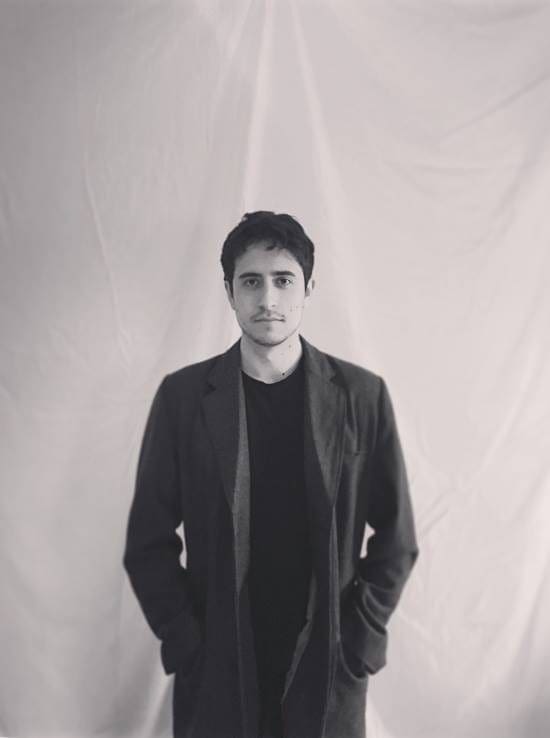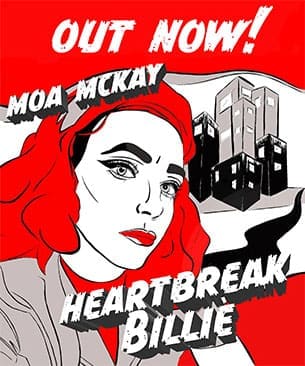Tiny Dolphin – otherwise masquerading as Regular Person™ Alex Fisher – drops his shiny new album Calm for Color today, you lucky things.
indieBerlin caught up with the performer and composer to discuss his latest record, and delved into the intricacies of his creative process in the meantime. As the first project released under his new alias, we were intrigued to see the direction he’d chosen to take with this most recent venture.
Calm for Color is a serene, meditative outing; lyrically speaking, it’s rich and fluid, showcasing Fisher’s ineffable songwriting talent. You’ve been warned in advance that you’ll have this album on repeat for quite a while – in parts, it’s so mellow you’ll feel yourself drifting into a sort of half-dream, while in others, the fabulously eighties synth sections will have you tapping your toes like a maverick.
Fisher explains that the record is “fundamentally one about relationships”, with the central theme being that of the “difficulty in trading in one’s comfort for emotional vulnerability”. It’s raw and personal, deliciously produced and beautifully executed. Each track tells a curious and spiritual story, leaving us with a perfectly constructed collection of tales which you’ll be humming for days.
indieBerlin: For those who might not be familiar with you, could you please tell us a little about your music?
Alex Fisher: Sure! Essentially, I hope that Tiny Dolphin can make listeners dance, cry, and everything in between. I was raised with classical and jazz piano, and picked up drums and guitar in my teenage years. Even though the album is indie rock, I think my varied musical background made its way in. I try to write lyrics which are creative without being cryptic, and I tend to like music that sounds textured and layered, so that’s what I aim for when I’m writing.
iB: Your new record Calm for Color is set for release on 17th May. Could you talk us through your creative process and inspiration behind this album? Where did the idea initially come from?
AF: I had always wanted to record my own album, but had only helped write or play in different bands. My first real solo project was an EP I recorded when I was living in Europe with pretty limited equipment. It was basically just me, my acoustic guitar, and a very elementary understanding of Ableton Live. So naturally the EP I recorded was indie-folk kind of stuff. This was before Tiny Dolphin was even an idea so it was released under my own name.
But I wanted to make something more energetic, colorful, and creative, that I could perform with a band. So that’s where the idea of Tiny Dolphin originated. I wrote the songs mainly as a form of catharsis without having a clear end goal, and once I had written several I realized I was on my way to a full album. Each song really had its unique inspiration. Some were inspired by past relationships, some by my current relationships, others by people I just knew, and some by my mother.
I would have liked the creative process to be more collaborative but it was just so easy to get back from work and write in my room. Although, my friend David recorded the bass on The Equation and Try and my friend Rachel recorded the violin on The Equation.
iB: Your compositions have a very fluid, ethereal quality (if that makes sense!). Do you have any non-musical influences which result in this intriguing sound?
AF: Thank you! Definitely makes sense. That’s a great question..I’ve always thought that some of my favorite artists give me the same feeling that impressionist or surrealist art gives me. If I could even come close to that then I think I’ve done well. But despite that association, a work of art hasn’t inspired to write a song yet (although Hopper’s Nighthawks came close). I think I’m just inspired by the relationships I have with people in my life. I probably owe any ethereal quality of my music to my influences, the biggest of which are probably Leif Vollebekk, James Blake, Sharon Van Etten, and Bon Iver.
iB: When writing a new track, do you focus on the music or lyrics first – or neither in particular? Could you tell us why?
AF: You know, I’ve done it both ways and I’m still trying to figure out what the best method is. For example, the lyrics for Man on the Moon came to me right before falling asleep so I had to get out of bed to write them all down. I put them away and forgot about them. Months later I remembered and tried to write music that could capture the feeling at the time. For The Equation on the other hand, I came up with the chord progressions and a few melodies on a piano in the basement of a university building in London and recorded them on my phone. It wasn’t until living in Austin almost a year later that I pulled them up and came up with lyrics.
I’ve become pretty aware now of how cathartic making music is for me, and that’s the main reason I do it.
iB: Lyrically, it seems like a pretty raw and personal record. Was the decision to share so much of yourself with your audience difficult, or did it seem in a way cathartic?
AF: Absolutely, I guess it was both. I’ve become pretty aware now of how cathartic making music is for me, and that’s the main reason I do it. I didn’t think about how personal the themes were while I was writing and recording, but I definitely had an “oh no” moment when I finished where I thought “am I really going to share all this personal stuff with acquaintances?” It’s still the reason I don’t tell my coworkers I even make music. Can you imagine someone in the coffee break room: “really liked that song about your crippling insecurities! See you at our 2pm meeting!”. No thank you. So yeah it’s a struggle, but but oh well that’s art right? I think it’s like letting someone read a chapter of your diary but it’s worth it if someone out there can really identify with it and get a feeling of comfort or understanding out of the song.
iB: Is there a story behind the artwork for this record?
AF: The art is of my studio apartment, where the majority of the songs were recorded. It’s an oil painting by my talented girlfriend, Sarah. Nothing really tied all the themes in the album together, so I thought a photograph or painting of my place would serve as a keepsake for this past year.
iB: Are there any changes you’d like to see happen in the music industry?
AF: Well, I wouldn’t be opposed to musicians getting more royalties. But I’m pretty unfamiliar with the music industry so far. Hopefully that will change soon!
iB: Having lived in Montreal, Austin, Munich and London, you must have seen your fair share of curious music scenes! In which city did you find you could be the most creative, and why do you think this is?
AF: Yes, definitely. I think London comes in first place. I’m not sure if it’s the diversity of the city’s population or just the strong music culture in the UK, but I went to so many small-scale shows on patios, in clubs, in basements, at parties, that I found incredibly talented. The city is also just inspiring.
iB: Do you have any upcoming projects which you’re particularly excited about?
AF: I’m really excited to put a band together and start playing this album live. If Tiny Dolphin gathers a strong enough following, I would record another album but this time in collaboration with the new musicians.
Piqued your interest? Check out Alex’s Spotify, or apply to be his number one fan here.


